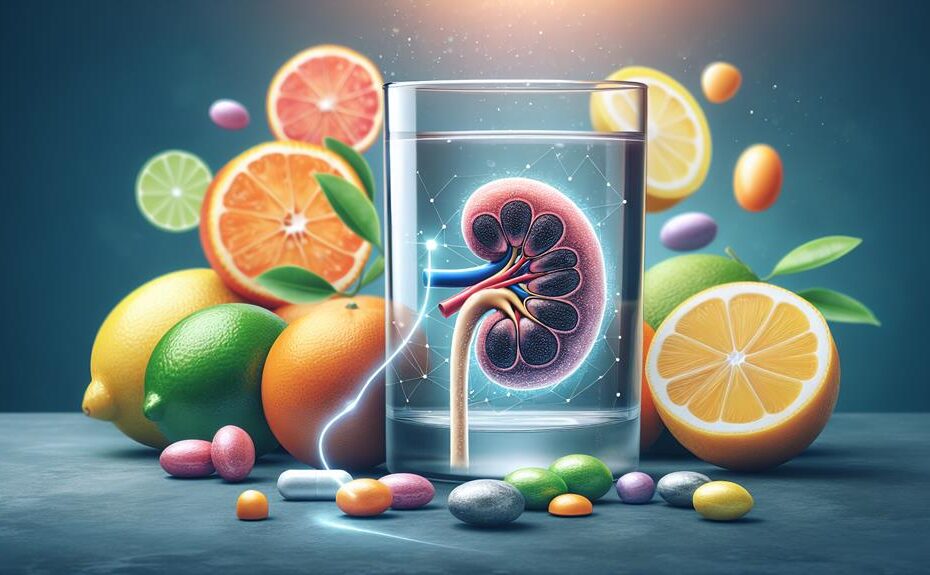







Excessive vitamin C supplements can heighten kidney stone risk. High doses may raise the risk of stone formation, especially when combined with oxalate-rich foods like spinach and nuts. Adequate hydration dilutes substances in urine to help prevent stone crystallization. Scientific studies indicate a link between high-dose vitamin C and increased stone risk, emphasizing the importance of balanced supplementation. Factors like diet and hydration levels also influence stone formation. Understanding the dynamics of vitamin C and kidney stones is pivotal for kidney health. Further insights await on managing vitamin C intake for best kidney health.
Key Takeaways
- High-dose vitamin C supplements may increase kidney stone risk.
- Oxalate-rich foods combined with excessive vitamin C intake can contribute to stone formation.
- Adequate hydration helps dilute substances that lead to stone formation.
- Genetics, diet, and hydration levels play vital roles in kidney stone risk.
- Balancing vitamin C intake and monitoring hydration levels can support kidney health.
Vitamin C and Kidney Stone Formation
When considering the relationship between vitamin C and kidney stone formation, it is important to examine the scientific evidence regarding their potential connection. Vitamin C is an essential nutrient found in various foods and supplements, known for its antioxidant properties and role in collagen synthesis. Some studies suggest a possible link between high doses of vitamin C supplements and an increased risk of kidney stone formation. However, the exact mechanism behind this association remains unclear.
Your dietary habits play a critical role in kidney stone formation. Consuming a diet high in oxalate-rich foods like spinach, nuts, and chocolate, coupled with excessive vitamin C intake, may contribute to stone formation. Additionally, hydration levels are key in preventing kidney stones. Adequate water intake helps dilute the substances in urine that can lead to stone formation, reducing the risk significantly.
Factors Influencing Kidney Stone Risk
Factors influencing kidney stone risk include dietary choices, hydration levels, and genetic predisposition. Dietary habits play an essential role in kidney stone formation. Consuming a diet high in oxalate-rich foods like spinach, nuts, and chocolate can increase the risk of calcium oxalate stone formation. Additionally, diets high in sodium and protein can lead to higher excretion of calcium in the urine, contributing to stone development. On the other hand, inadequate hydration levels can concentrate minerals in the urine, promoting stone crystallization. Dehydration reduces urine volume, making it easier for stones to form. Genetic predisposition also plays a significant role in kidney stone risk. Certain genetic factors can influence how the body processes minerals, making some individuals more prone to stone formation. Understanding and modifying these factors through dietary modifications and maintaining proper hydration levels can help reduce the risk of developing kidney stones.
Scientific Studies on Vitamin C Supplementation

Scientific studies have investigated the potential relationship between vitamin C supplementation and the formation of kidney stones. While vitamin C is known for its antioxidant benefits and immune system boosters, some studies have suggested a possible link between high-dose vitamin C supplements and an increased risk of kidney stone formation. However, the evidence is not conclusive.
A study published in JAMA Internal Medicine in 2013 found that men who took vitamin C supplements at a dose of 1,000 mg per day had a higher risk of kidney stones than those who did not take supplements. On the other hand, a review published in the European Journal of Nutrition in 2016 concluded that moderate vitamin C supplementation did not increase the risk of kidney stone formation.
It is important to note that individual factors such as overall health, diet, and hydration levels also play a significant role in kidney stone formation. Further research is needed to fully understand the potential impact of vitamin C supplementation on kidney stone development.
Understanding Oxalate and Kidney Stones
Understanding the role of oxalate in kidney stone formation is essential for grasping the connection between diet and kidney stone risk. Oxalate is a naturally occurring compound found in many plant foods, and when it combines with calcium in the kidneys, it can form crystals that may lead to kidney stone development. Oxalate metabolism varies among individuals, with some being more prone to absorb oxalate from their diet, potentially increasing their risk of kidney stones.
Dietary sources rich in oxalate include spinach, rhubarb, beets, nuts, and chocolate. Notably, not all individuals who consume high-oxalate foods will develop kidney stones, as genetics, overall diet, and hydration levels also play vital roles. When considering the relationship between oxalate and kidney stones, moderation and balance are key. Monitoring oxalate intake, ensuring an adequate calcium intake to bind with oxalate in the digestive tract, and staying hydrated are essential steps in reducing the risk of kidney stone formation related to oxalate consumption.
Balancing Vitamin C Intake for Kidney Health

Balancing your vitamin C intake is important for maintaining kidney health and preventing potential complications such as kidney stones. Vitamin C is essential for various bodily functions, including supporting the immune system and aiding in the absorption of iron. When it comes to kidney health, moderation is key. While dietary sources like citrus fruits, strawberries, and bell peppers provide natural vitamin C without greatly increasing the risk of kidney stones, excessive intake from supplements may pose a higher risk due to the metabolism of vitamin C into oxalate, a compound known to contribute to stone formation.
In addition to being mindful of your vitamin C intake, staying well-hydrated is crucial for kidney health. Adequate hydration helps prevent the concentration of substances that can lead to crystal formation in the kidneys. By balancing your vitamin C intake from dietary sources and monitoring your hydration levels, you can support your kidneys and reduce the risk of developing kidney stones.
Recommendations for Safe Vitamin C Use
For safe vitamin C use, it is important to take into account recommended daily allowances and seek advice from a healthcare provider if thinking about supplementation. Vitamin C dosage is a vital factor to take into consideration to maintain kidney health. The Recommended Dietary Allowance (RDA) for vitamin C varies by age and sex, with adult males needing around 90 mg per day and adult females needing around 75 mg per day. It's important not to exceed the tolerable upper intake level, which is 2,000 mg per day for adults, as excessive intake can lead to adverse effects, including kidney stone formation in susceptible individuals.
When considering vitamin C supplements, it's advisable to choose reputable brands that undergo quality testing to guarantee purity and potency. Always follow the recommended dosage instructions provided by the manufacturer or your healthcare provider. If you have any pre-existing kidney conditions or concerns about kidney health, consult a healthcare professional before starting any new supplement regimen to make sure it is safe for you. Remember, moderation and informed decision-making are key to using vitamin C safely for overall health and kidney function.



